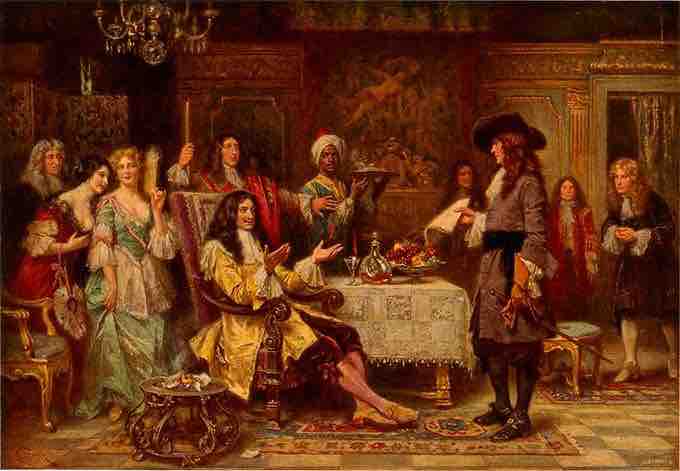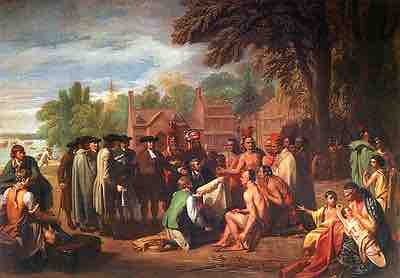The Establishment of Pennsylvania and Delaware
In 1681, William Penn founded the Province of Pennsylvania, also known as Pennsylvania Colony, in British America by royal charter. Penn received the charter for Pennsylvania from Charles II and brought over Quaker dissidents from England, Wales, the Netherlands, and France. The colonial government, established in 1682 by Penn's Frame of Government, consisted of an appointed governor, the proprietor, a Provincial Council, and a larger General Assembly.

The Birth of Pennsylvania, 1680
William Penn, holding paper, standing and facing King Charles II, in the King's breakfast chamber at Whitehall.
Between 1669 and 1672, Delaware was an incorporated county under the Province of Maryland. The Mason-Dixon line is said to have legally resolved vague outlines between Maryland and Pennsylvania and awarded Delaware to Pennsylvania. Delaware Colony became a region of the Province of Pennsylvania, although never legally a separate colony. From 1682 until 1776, it was part of the Penn proprietorship and was known as the Lower Counties. In 1701, it gained a separate assembly from the three upper counties but continued to have the same governor as the rest of Pennsylvania. Delaware, however, would eventually prove too independent, leading to the ultimate separation from Pennsylvania and unique pioneer status as America's first state, tied to neither province's destiny.
William Penn had asked for and later received the lands of Delaware from the Duke of York. Penn had a hard time governing Delaware because the economy and geology were largely the same as that of the Chesapeake, rather than that of his Pennsylvania territory. He attempted to merge the governments of Pennsylvania and Delaware. Representatives from both areas clashed and, in 1701, Penn agreed to two separate assemblies. Delawareans would meet in New Castle and Pennsylvanians would gather in Philadelphia. Delaware continued to be a melting pot of sorts and was home to Swedes, Finns, Dutch, and French, in addition to the English, who constituted the dominant culture.
American Indian Relations
The Charter of Privileges
The Charter of Privileges mandated fair dealings with American Indians. This led to significantly better relations with the local tribes such as the Lenape and Susquehanna than most other colonies had. The Quakers had previously treated American Indians with respect, bought land from them voluntarily, and even had representation of American Indians on juries. The Quakers also refused to provide any assistance to New England's Indian wars.

The Treaty of Penn with the Indians
Benjamin West's painting (in 1771) of William Penn's 1682 treaty with the Lenni Lenape.
Lost Trust and Land Disputes
In 1737, the Colony spent a great deal of its political goodwill with the native Lenape in pursuit of more land. The colonial administrators claimed that they had a deed dating to the 1680s, in which the Lenape-Delaware had promised to sell a portion of land beginning between the junction of the Delaware River and Lehigh River, near present Wrightstown, Pennsylvania. The document was most likely a forgery; nonetheless, the Provincial Secretary set in motion a plan to grab as much land as possible. In the end, the Penns gained 1,200,000 acres of land in what is now northeastern Pennsylvania, an area roughly equivalent to the size of the state of Rhode Island. The Lenape tribe fought for the next 19 years to have the treaty annulled but was forced into the Shamokin and Wyoming Valleys, which were already overcrowded with other displaced tribes.
Religious Freedom
George Fox had founded the Society of Friends (commonly known as Quakers) in England in the late 1640s, having grown dissatisfied with Puritanism and the idea of predestination. Rather, Fox and his followers stressed that everyone had an “inner light” inside him or her—a spark of divinity. They gained the name Quakers because they were said to quake when the inner light moved them. Quakers rejected the idea of worldly rank, believing instead in a new and radical form of social equality. Their speech reflected this belief in that they addressed all others as equals, using “thee” and “thou” rather than terms like “your lordship” or “my lady” that were customary for privileged individuals of the hereditary elite.
The "Holy Experiment" was an attempt by the Religious Society of Friends to establish a community in Pennsylvania. William Penn and his fellow Quakers imprinted their religious values on the early Pennsylvanian government; the Charter of Privileges extended religious freedom to all monotheists, and the government was initially open to all Christians. Until the French and Indian War, Pennsylvania had no militia, few taxes, and no public debt. It also encouraged the rapid growth of Philadelphia into America's most important city, and of the Pennsylvania Dutch Country hinterlands, where German religions and political refugees prospered on the fertile soil and spirit of cultural creativeness. Among the first settlers were the Mennonites, who founded Germantown in 1683, and the Amish, who established the Northkill Amish Settlement in 1740. Despite Quaker opposition to slavery, by 1730 colonists had brought about 4,000 slaves into Pennsylvania. The Pennsylvania Gradual Abolition Act of 1780 was the first attempt to abolish slavery in the colonies.